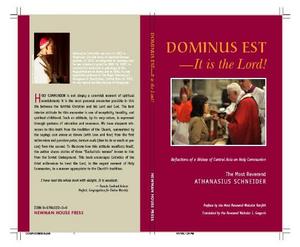Bishop Athanasius Schneider, an auxiliary bishop of the Diocese of Karaganda,
 Kazakhstan, published a book, Dominus Est, dealing with the history, theology and pastoral practice of receiving Holy Communion. The book is reviewed by Dr. Alcuin Reid.
Kazakhstan, published a book, Dominus Est, dealing with the history, theology and pastoral practice of receiving Holy Communion. The book is reviewed by Dr. Alcuin Reid.
No doubt many of us receive Holy Communion without considering what the gesture of receiving means at the level of symbol, that is, at the level of deepest reality. We are given "a pledge of future glory," says the prayer of Saint Thomas Aquinas, so what does it mean to mean receive this pledge in the hand? Theologically, does it mean anything to receive the Lord in the hand versus on the tongue? Do we take a gift or do we receive a gift? I wonder if the hand is the most appropriate "tool" to receive the Eucharistic Lord. If we truly believe one's reception of the Lord in Communion is an act of reception not an act of taking, then is receiving the Lord in the hand and picking Him up with our fingers the most appropriate act of worship? The question needs to be answered in terms of how Communion is received so that we know at the deepest places in the heart, that we are receiving the Lord Himself. How does our reception of Communion exhibit the deepest reverence for the Blessed Sacrament?
The liturgy establishment -and those who pretend to know the liturgical life of the Church--have argued that receiving Communion in the hand is rooted in the practice of apostolic times. The author argues that scholars, as well as bishops and priests, have misread the early church documents about the practice of receiving Holy Communion in the hand and therefore what we know today bears no resemblance to how our Christians received Holy Communion in apostolic period. The point, therefore, is that our scholars and priests have used an archeologistic argument to force the issue of receiving Communion in hand by saying that people didn't receive communion on the tongue in the earlier periods of Church history.
 This is not only a matter for the laity. The ordained need to reflect on how they receive the Eucharistic Lord, too. There is ample evidence that what the priests do today is also theologically suspect. In the earlier centuries of the Church no one, not even the pope and bishops, self-communicated Communion. Even though prayer the great Eucharistic prayer he would never presume to take Communion; It was administered to the pope, bishops and priests by the deacon. But I digress.
This is not only a matter for the laity. The ordained need to reflect on how they receive the Eucharistic Lord, too. There is ample evidence that what the priests do today is also theologically suspect. In the earlier centuries of the Church no one, not even the pope and bishops, self-communicated Communion. Even though prayer the great Eucharistic prayer he would never presume to take Communion; It was administered to the pope, bishops and priests by the deacon. But I digress.
The book retails for $8.00, with 50% off for five or more copies to the same address ($2 each for shipping/handling). Send to: Newman House Press, 601 Buhler Court, Pine Beach, NJ 08741. Or visit: http://jhcnewman.org.


Allowing communion to be received in the hand can lead to some very serious abuses. I have heard of situations where individuals have: placed the host under the pew or in a missalette, or took the host out of the church for use in a black Mass or to be desecrated. There can be disrespect in the action of receiving. Some people grab the host from you with one hand when they are receiving. Some children have their sleeves covering their hands so that there isn't anywhere to place the host. Sometimes people place their hands side by side with a gap in the middle and you hope that the host will not fall into the gap and onto the floor. A few communicants have tried to dip the host into the precious blood because they are afraid to drink from a shared cup. I recall that one Bishop recently stopped distributing the cup for a while in his diocese because of a flu spreading through the area. It seems that the byzantine/eastern rite churches have the best method. With the body and blood being dropped via a tiny spoon into the mouth of the receipient, many of these problems could be prevented.
Thanks, Mary for the comment. I think you are very correct in your judgment. I have seen similar things and have had similar fears in the possible impious actions of the faithfu. One can think of the recent professor at the Univ of MN advocating the abuse of the Blessed Sacrament. Even receiving Holy Communion can lead to similar abuses in that a person can remove the Eucharist from his mouth and do ugly things with it. I want to get to another level of the conversation and that is theological and not only react to abuses. What are the theological principles for receiving the Lord on the tongue? in the hand? Is there some method discerning this matter? At this moment in our Church's history we can't just make an argument from authority, otherwise the reasons for liturgical practice become legalistic and moralistic. There needs to be an internal solidification of theology and liturgical practice in the life of the believer. It seems to me if we follow the Lord and adhere to His beauty, then thinking and acting theologically is crucial. I don't follow a crude Lord nor a mechanistic Church. I follow a personal Savior and sacramental Church thereby living in the life of the Trinity. Either we truly believe in and act as though the Lord is real and truly present in the consecrated Gifts of bread and wine or we are frauds. This is one of the reasons I raised the example of how the clergy received the Eucharist in the early centuries and how their own arrogance (ignorance?) changed ecclesial practice. Do we take gift or receive a gift?
If every Catholic came to have a deep relationship with Our Lord and a grateful attitude for this great gift of himself in the Holy Eucharist, then the Eucharist would be treated with the utmost respect, not just in receiving communion, but when passing by the tabernacle, or when in Jesus's presence in church. This requires a great conversion of heart in the people. Only when this conversion of heart takes place will Holy Communion truly be understood as the gift that it is.
See, I wonder if we could begin thinking that conversion has already happened by the reception of Baptism and with the other sacraments of initiation (Eucharist & Confirmation). Therefore, the work of coming to know the Lord is ongoing. That is, we are already converted (a point in history) and we come to know the Lord more deeply as time goes on (a process through our history). So what you might call a "great conversion" I want to suggest we call an awareness or attentiveness to grace present since Baptism. AND the Eucharistic (liturgical) abuses that we experience are a failure to take seriously our Christian initiation. Nonetheless, yes, you're correct that the heart needs to change in order to recognize and reverence the Lord properly.